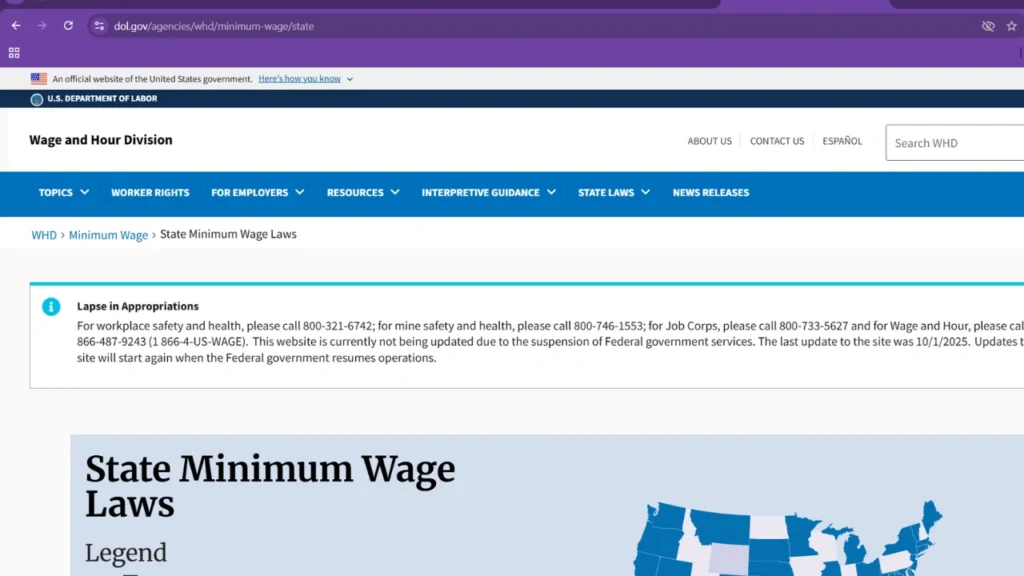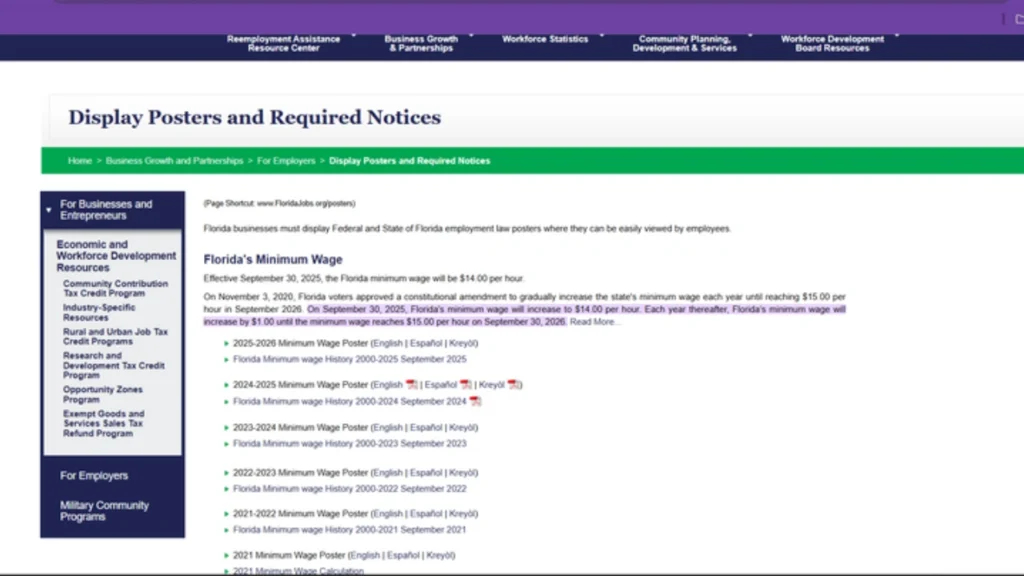If you are working in Florida, the paycheck you take home each week may have recently changed. Thanks to a voter-approved plan to gradually boost wages across the state, the New Florida Minimum Wage 2025 is now in effect. As of September 30, 2025, non-tipped workers must be paid at least $14 per hour, while tipped workers must earn a base of $10.98, with total earnings (including tips) hitting that $14 mark.

The New Florida Minimum Wage 2025 increase is part of a broader effort to make earnings more livable in a state where housing, groceries, and utilities have steadily become more expensive. Understanding how this change works, who it impacts, and what both employees and employers need to do is essential if you want to stay on top of your rights and responsibilities.
New Florida Minimum Wage 2025: What It Means for Workers and Employers

The New Florida Minimum Wage 2025 represents another step toward the state’s planned $15 minimum wage by 2026. This year’s $14 per hour requirement is not optional. Employers must comply, and workers should ensure they are being paid correctly. The increase also aims to create more predictable incomes for tipped employees, who often face fluctuating wages depending on customer generosity.
Florida’s minimum wage increase is not just about adjusting numbers. It reflects a wider issue—how to keep up with rising living costs. According to the National Low Income Housing Coalition, someone in Florida would need to earn more than $37 per hour to comfortably afford a two-bedroom rental without spending over 30 percent of their income on housing. While $14 is still far from that, it brings hourly pay closer to reality for many.
Overview Table – New Florida Minimum Wage 2025
| Category | Details |
| Effective Date | September 30, 2025 |
| Minimum Wage (Non-Tipped) | $14 per hour |
| Tipped Worker Base Pay | $10.98 per hour |
| Required Minimum with Tips | $14 per hour |
| Previous Wage (2024) | $13 per hour |
| Planned 2026 Wage | $15 per hour |
| Future Increases | Tied to inflation post-2026 |
| Employers’ Responsibilities | Update payroll and signage, ensure compliance |
| Workers’ Rights | File complaints if underpaid |
| Source of Policy | 2020 voter-approved amendment |
Why Are Wages Going Up?
This rise in the minimum wage is part of a legal change that Florida voters approved in 2020. Known as Amendment 2, the law created a path for gradual wage increases over several years. The goal? To make wages more aligned with the cost of living.
Everything from rent to food to fuel has gone up in recent years. For many workers, especially those in lower-wage roles, the gap between what they earn and what they need has been growing. This policy is designed to close that gap little by little. By 2026, Florida is set to hit the $15 per hour mark, and from there, increases will adjust based on inflation.
New Wage Rates for Employees in 2025
With the New Florida Minimum Wage 2025 now in effect, here is what workers need to know:
- If you are not a tipped worker, your employer must pay you $14 per hour, no exceptions.
- If you are a tipped worker, your base wage is $10.98 per hour. Your tips must raise your total to at least $14 per hour.
- If your tips fall short, your employer is legally obligated to make up the difference.
This is a huge improvement for workers in hospitality, food service, and other tipped industries where wages can be unpredictable. It means more financial stability and a better chance to keep up with daily expenses.
What Employers and Workers Should Do
Employers in Florida must ensure full compliance with the New Florida Minimum Wage 2025. That includes:
- Updating workplace posters that display minimum wage rates.
- Adjusting payroll systems to reflect the new hourly rate.
- Training HR and accounting staff to understand how tip credits work.
Employees should also take a proactive approach. Keep an eye on your pay stubs. Make sure your total hourly wage meets or exceeds the legal minimum. If you suspect you are being underpaid, you have every right to file a complaint with the Florida Attorney General’s Office.
What This Means for Tipped Workers
Tipped workers are a major focus of this wage update. Many rely on tips to reach minimum wage or beyond, and those tips can vary greatly depending on the time of year, the economy, or even the weather. The New Florida Minimum Wage 2025 ensures that even on a slow day, workers are not short-changed.
By increasing the base wage to $10.98 and requiring employers to fill any tip-related gaps, the state offers stronger wage protections. This is particularly important in restaurants, bars, hotels, and salons—industries where tips are the norm but not always guaranteed.
Preparing for the Final Increase in 2026
This year’s wage hike is the second-to-last step before Florida reaches a $15 minimum wage in 2026. Once that goal is met, any future wage increases will be linked to inflation, allowing wages to adjust with economic conditions automatically.
For employers, this means more changes ahead and the need for careful planning. For workers, it is a sign of more secure and hopefully livable income in the near future. Stay informed as the changes roll out, and be sure to speak up if your workplace is not following the law.
FAQs
1. What is the current minimum wage in Florida as of 2025?
The current minimum wage is $14 per hour for non-tipped employees.
2. How much do tipped employees earn now?
Tipped employees receive a base wage of $10.98. Their total hourly pay, including tips, must be at least $14.
3. What happens if tips do not cover the difference?
If tips do not bring earnings up to $14 per hour, the employer must pay the difference.
4. When will the wage increase again?
Florida’s minimum wage will rise to $15 in 2026. After that, increases will be adjusted annually based on inflation.
5. What should I do if I am not being paid correctly?
You can file a wage complaint with the Florida Attorney General’s Office or contact your local labor department for help.
Final Thoughts
The New Florida Minimum Wage 2025 marks an important moment for both workers and businesses. It is a reminder that fair pay matters, especially in a time when the cost of living continues to rise. For employees, this wage boost can provide more security and a better chance at financial stability. For employers, it is a call to ensure they are meeting legal obligations and treating their workforce fairly.
As we move toward 2026 and the final scheduled increase, staying educated on wage laws and understanding how they apply in your role will be more important than ever. Whether you are clocking in as a barista, retail associate, line cook, or delivery driver, know your rights and make sure your paycheck reflects them.


















